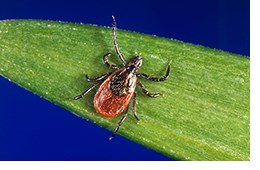THUNDER BAY — The chance of getting Lyme disease from the bite of a black-legged tick has risen substantially in the Thunder Bay region this year.
It's because a far greater percentage of ticks tested for the bacteria that causes the disease is testing positive than in previous years.
The disclosure came Tuesday in a notice from the Thunder Bay District Health Unit.
It operates a surveillance program in which a health unit employee searches for ticks in areas around the city where they have been found in the past.
According to TBDHU, nearly 63 per cent of black-legged ticks – also known as deer ticks – collected so far were found to have Lyme disease bacteria.
It's a steep increase from previous years, where only about 10 per cent of these ticks tested positive.
The health unit did not disclose how many ticks were tested.
Public Health Ontario has designated the City of Thunder Bay and immediate surrounding area as an endemic region for Lyme disease.
A bite from an infected tick can have serious effects on the central nervous system, the cardiovascular system and the joints.
Symptoms may include a "bulls-eye" rash, fatigue, chills, fever, headache, muscle and joint pain, and swollen lymph nodes.
The signs typically show up between three and 30 days after a black-legged tick has fed for more than 24 hours.
However, not everyone will develop symptoms.
Health officials advise people walking through brush or tall grass, in particular, to stay vigilant, including in a local tick hotspot – the Rabbit Mountain lookout trails off Belrose Road.
They recommend that precautions be taken when planning outdoor activities including:
- wear long sleeves and tuck your pants into your socks
- wear light-coloured clothing, which makes it easier to see a tick
- apply insect repellants that contain DEET or Icaridin
- routinely perform a tick check, including the hairline, underarms, stomach and groin
Anyone who believes they have found a black-legged tick should submit it to the health unit for identification.
Individuals who find a tick attached to their body should speak to a health care provider.
Although Lyme disease is debilitating if left untreated, it can be cured by the early administration of antibiotics.
